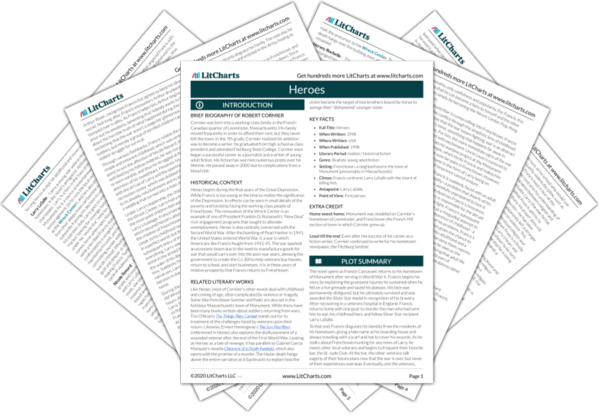The “Wreck Center” (the nickname for Monument’s recreation center) symbolizes the danger of attempting to disguise or bury internal pain and trauma instead of confronting it. Even though the Wreck Center has been renovated and renamed, it is still haunted by its horrific past as the site of a gruesome murder-suicide. The shoddy workmanship of the building’s renovations is a nod to the notion that attempting to cover up problems can never truly erase or disguise them, and the nickname “Wreck Center” shows how the horror of the building’s past lingers in the minds of Frenchtown residents. Ultimately, Joey LeBlanc’s prophesy of impending (or, rather, returning) doom at the Wreck Center comes to pass when Larry LaSalle rapes Nicole Renard there. Since the Wreck Center was a central part of Francis’ childhood (and the site of its abrupt end when he witnessed Nicole’s rape), the Wreck Center serves mainly as a metaphorical parallel for Francis’s attempts to disguise his past traumas. On a literal level, he physically hides his war wounds beneath a scarf and a cap (paralleling the Wreck Center’s renovations), and on a figurative level, he hides the trauma of his childhood behind anonymity once he returns to Frenchtown (much like the name change from Grenier Hall, the site of the murder-suicide, to the Recreation Center). Ultimately, the Wreck Center serves as a warning, showing that hiding from trauma can lead those traumas to return.
The Wreck Center Quotes in Heroes
The Wreck Center became my headquarters in the seventh and eighth grade, a place away from the sidewalks and empty lots of Frenchtown. I had never been a hero in such places, too short and un-coordinated for baseball and too timid to join the gangs that hung around the street corners.
Dazzled by his talent and his energy, most of us didn't dwell on the rumors. In fact, the air of mystery that surrounded him added to his glamour. He was our champion, and we were happy to be in his presence.












